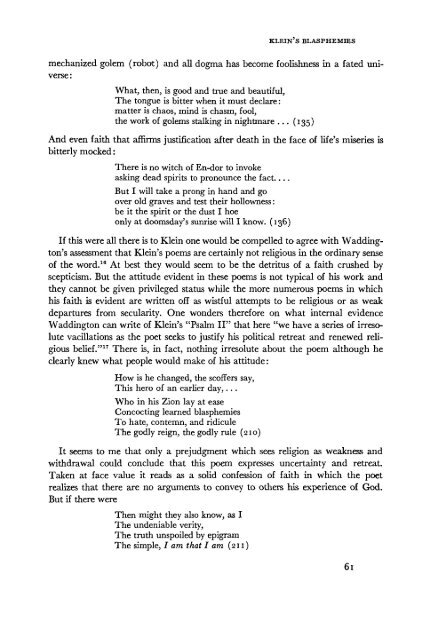THE BLASPHEMIES OF A. M. KLEIN
THE BLASPHEMIES OF A. M. KLEIN
THE BLASPHEMIES OF A. M. KLEIN
You also want an ePaper? Increase the reach of your titles
YUMPU automatically turns print PDFs into web optimized ePapers that Google loves.
<strong>KLEIN</strong> S <strong>BLASPHEMIES</strong><br />
mechanized golem (robot) and all dogma has become foolishness in a fated universe:<br />
What, then, is good and true and beautiful,<br />
The tongue is bitter when it must declare :<br />
matter is chaos, mind is chasm, fool,<br />
the work of golems stalking in nightmare ... (135)<br />
And even faith that affirms justification after death in the face of life's miseries is<br />
bitterly mocked :<br />
There is no witch of En-dor to invoke<br />
asking dead spirits to pronounce the fact....<br />
But I will take a prong in hand and go<br />
over old graves and test their hollowness :<br />
be it the spirit or the dust I hoe<br />
only at doomsday's sunrise will I know. (136)<br />
If this were all there is to Klein one would be compelled to agree with Waddington's<br />
assessment that Klein's poems are certainly not religious in the ordinary sense<br />
of the word. 16 At best they would seem to be the detritus of a faith crushed by<br />
scepticism. But the attitude evident in these poems is not typical of his work and<br />
they cannot be given privileged status while the more numerous poems in which<br />
his faith is evident are written off as wistful attempts to be religious or as weak<br />
departures from secularity. One wonders therefore on what internal evidence<br />
Waddington can write of Klein's "Psalm II" that here "we have a series of irresolute<br />
vacillations as the poet seeks to justify his political retreat and renewed religious<br />
belief." 17 There is, in fact, nothing irresolute about the poem although he<br />
clearly knew what people would make of his attitude:<br />
How is he changed, the scoffers say,<br />
This hero of an earlier day,...<br />
Who in his Zion lay at ease<br />
Concocting learned blasphemies<br />
To hate, contemn, and ridicule<br />
The godly reign, the godly rule (210)<br />
It seems to me that only a prejudgment which sees religion as weakness and<br />
withdrawal could conclude that this poem expresses uncertainty and retreat.<br />
Taken at face value it reads as a solid confession of faith in which the poet<br />
realizes that there are no arguments to convey to others his experience of God.<br />
But if there were<br />
Then might they also know, as I<br />
The undeniable verity,<br />
The truth unspoiled by epigram<br />
The simple, / am that I am (211)<br />
61

















